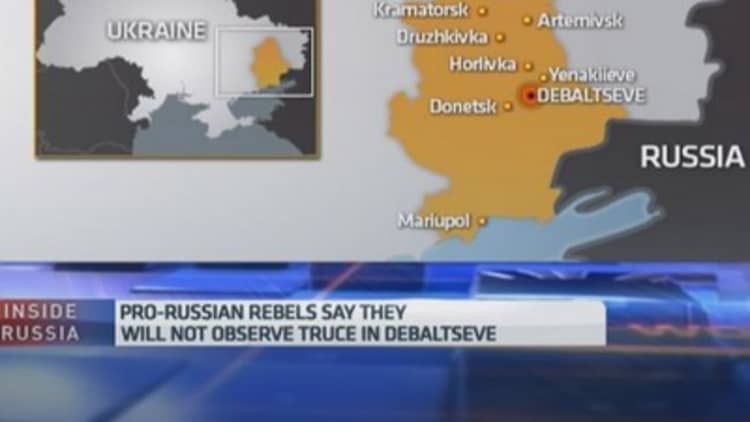As the supposed cease-fire in Ukraine fails to end the bloodshed in the east of the country, fresh data on Tuesday showed the extent of the pain being felt within the country's economy.
The country - ravaged by conflict between government troops and pro-Russian separatists – posted a fall in gross domestic product (GDP) of 15.2 percent year-on-year in the fourth quarter of 2014, according to the State Statistics Service of Ukraine on Tuesday morning. The figures also showed a 3.8 percent fall from the previous quarter amid the political upheaval in Kiev.
The data were the worst for several years and are significantly down from the 5.3 percent contraction (year-on-year) recorded in the third quarter. They also come alongside some dismal trade balance data, which highlighted weak domestic demand in the country.
Timothy Ash, head of emerging markets at Standard Bank, said the figures were a sad indictment of the international community.
"Despite all the rhetoric that they would not allow Ukraine to fail, they failed to support Ukraine in its hour of need," he said in a note on Tuesday.
"Western credit disbursements were a fraction of what was promised, but at the same time the Ukrainians were advised to pay external debt payments in full, and to clear gas debts to Russia."
Ukraine's trade deficit – when imports exceed exports -- narrowed sharply in 2014 to $468.3 million, according to Reuters on Monday, as demand waned. This was significantly down from 2013's $13.5 billion and was due to a collapse in imports and a sharp depreciation of Ukraine's hryvnia currency.
Ukraine was thrown into turmoil at the start of last year, after protests between anti-government and pro-EU demonstrators led to a change of leadership. Tensions on the streets of Kiev turned into military conflicts on the eastern border, with Moscow accused of aiding pro-Kremlin rebels in the region. Moscow continues to deny the involvement of Russian troops in the conflict.
Billionaire investor George Soros is one notable voice that has called on European officials to urgently boost their efforts to support the Ukrainian economy. In January, he argued that strengthening Ukraine's economy was more important to the euro zone than the ongoing political uncertainty in member countries like Greece.

The International Monetary Fund (IMF) has introduced a new Extended Fund Facility for Ukraine, in addition to its existing aid package for the country. It has also received financial help from the U.S., the European Union and the World Bank. However, Ukraine appears to need more money to stay afloat, according to Ash, amid rampant inflation and the near-halting of economic activity in regions where there is still military conflict.
"Beyond the IMF, official creditors in general need to cut out the cheap talk of supporting Ukraine, and preventing its financial meltdown - accept that they failed already and to figure out how they actually rebuild from here," he said.
"Arguably if the West is set on not arming Ukraine then it really needs to do more to financially support the country in its hour of need. Talk is cheap, and actions speak much louder than words."


